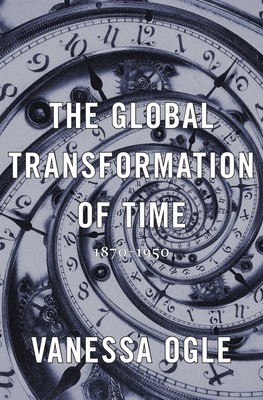
- We will send in 10–14 business days.
- Author: Vanessa Ogle
- Publisher: Harvard University Press
- ISBN-10: 0674286146
- ISBN-13: 9780674286146
- Format: 16.3 x 23.6 x 2.5 cm, hardcover
- Language: English
- SAVE -10% with code: EXTRA
Reviews
Description
As new networks of railways, steamships, and telegraph communications brought distant places into unprecedented proximity, previously minor discrepancies in local time-telling became a global problem. Vanessa Ogle's chronicle of the struggle to standardize clock times and calendars from 1870 to 1950 highlights the many hurdles that proponents of uniformity faced in establishing international standards.
Time played a foundational role in nineteenth-century globalization. Growing interconnectedness prompted contemporaries to reflect on the annihilation of space and distance and to develop a global consciousness. Time--historical, evolutionary, religious, social, and legal--provided a basis for comparing the world's nations and societies, and it established hierarchies that separated "advanced" from "backward" peoples in an age when such distinctions underwrote European imperialism. Debates and disagreements on the varieties of time drew in a wide array of observers: German government officials, British social reformers, colonial administrators, Indian nationalists, Arab reformers, Muslim scholars, and League of Nations bureaucrats. Such exchanges often heightened national and regional disparities. The standardization of clock times therefore remained incomplete as late as the 1940s, and the sought-after unification of calendars never came to pass. The Global Transformation of Time reveals how globalization was less a relentlessly homogenizing force than a slow and uneven process of adoption and adaptation that often accentuated national differences.EXTRA 10 % discount with code: EXTRA
The promotion ends in 12d.02:04:01
The discount code is valid when purchasing from 10 €. Discounts do not stack.
- Author: Vanessa Ogle
- Publisher: Harvard University Press
- ISBN-10: 0674286146
- ISBN-13: 9780674286146
- Format: 16.3 x 23.6 x 2.5 cm, hardcover
- Language: English English
As new networks of railways, steamships, and telegraph communications brought distant places into unprecedented proximity, previously minor discrepancies in local time-telling became a global problem. Vanessa Ogle's chronicle of the struggle to standardize clock times and calendars from 1870 to 1950 highlights the many hurdles that proponents of uniformity faced in establishing international standards.
Time played a foundational role in nineteenth-century globalization. Growing interconnectedness prompted contemporaries to reflect on the annihilation of space and distance and to develop a global consciousness. Time--historical, evolutionary, religious, social, and legal--provided a basis for comparing the world's nations and societies, and it established hierarchies that separated "advanced" from "backward" peoples in an age when such distinctions underwrote European imperialism. Debates and disagreements on the varieties of time drew in a wide array of observers: German government officials, British social reformers, colonial administrators, Indian nationalists, Arab reformers, Muslim scholars, and League of Nations bureaucrats. Such exchanges often heightened national and regional disparities. The standardization of clock times therefore remained incomplete as late as the 1940s, and the sought-after unification of calendars never came to pass. The Global Transformation of Time reveals how globalization was less a relentlessly homogenizing force than a slow and uneven process of adoption and adaptation that often accentuated national differences.

Reviews